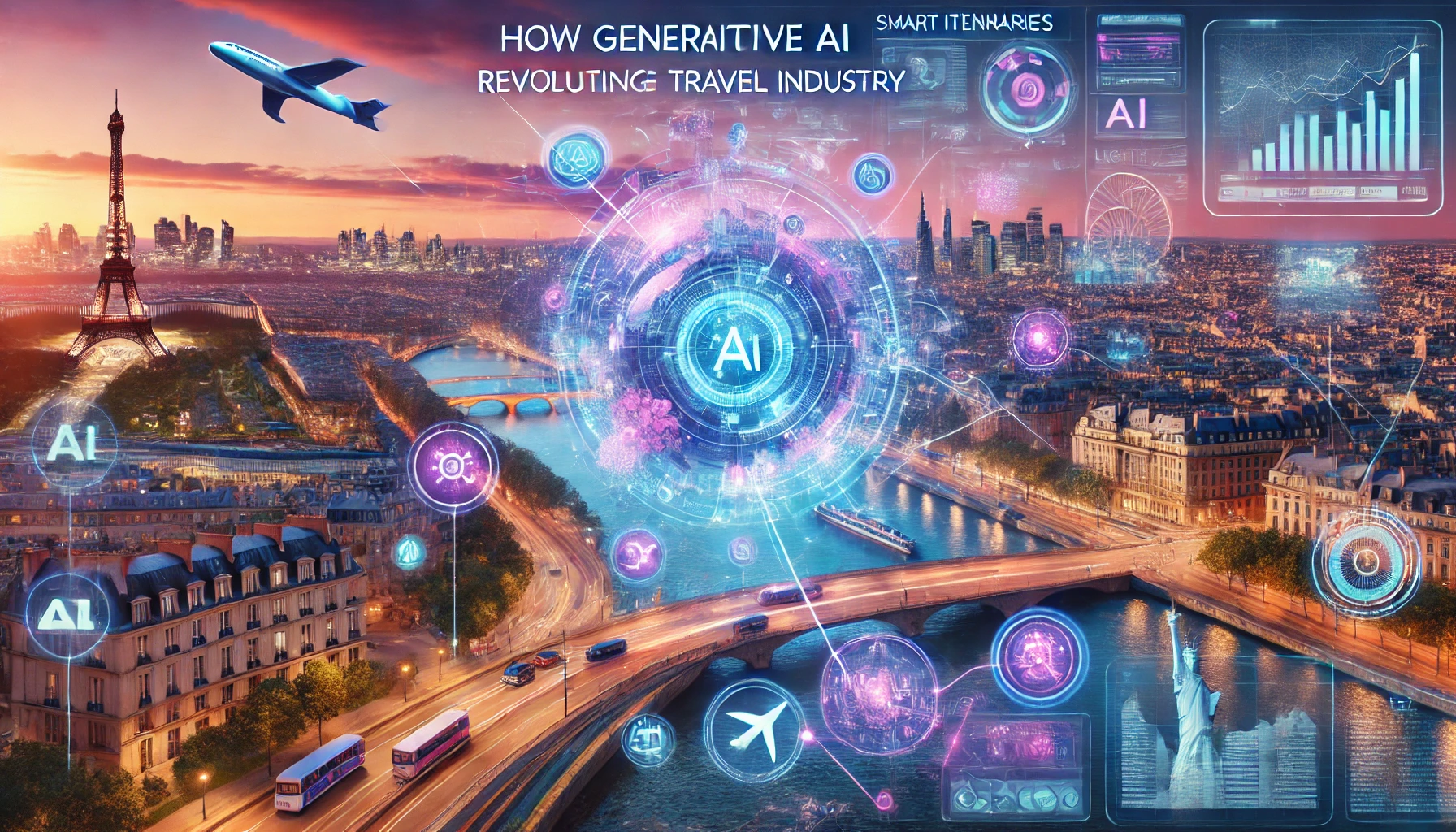The travel industry is experiencing a paradigm shift with the advent of generative Artificial Intelligence. This cutting-edge technology is reshaping how we plan, book, and experience travel, offering unprecedented levels of personalization and efficiency. As Artificial Intelligence continues to evolve, its impact on the travel sector is becoming increasingly profound, promising to deliver more tailored experiences and streamline operations.

The travel industry, long known for its dynamic and evolving nature, is currently undergoing a transformation unlike any before, thanks to generative Artificial Intelligence. This technology, which creates content, solutions, and predictions from vast datasets, is revolutionizing travel by providing personalized experiences and enhancing operational efficiency. The integration of generative AI into travel services is not only improving customer satisfaction but also opening new avenues for innovation and growth within the industry.
Generative Artificial Intelligence in Travel
What is Generative AI?
Generative Artificial Intelligence is a subset of artificial intelligence that focuses on creating new content and solutions based on existing data. Unlike traditional Artificial Intelligence, which follows predefined rules and patterns, generative Artificial Intelligence can produce novel outputs, making it ideal for applications requiring creativity and personalization. In the travel industry, this means generating personalized travel itineraries, creating unique marketing content, and predicting travel trends with high accuracy.
Enhancing Personalization in Travel
One of the most significant impacts of generative Artificial Intelligence in the travel industry is its ability to enhance personalization. Travelers today seek unique experiences tailored to their preferences and needs. Generative Artificial Intelligence can analyze vast amounts of data from various sources, including social media, past travel behavior, and user preferences, to create highly personalized travel plans. This level of customization was previously unattainable, but with generative Artificial Intelligence, travel agencies and service providers can offer tailor-made experiences that resonate with individual travelers.
Streamlining Booking Processes
Generative Artificial Intelligence is also revolutionizing the booking process. Traditional booking systems often involve multiple steps and can be time-consuming and prone to errors. Artificial Intelligence-powered booking platforms can streamline this process by automatically generating booking options that match the traveler’s preferences and constraints. This not only saves time but also reduces the likelihood of errors, making the booking experience more seamless and efficient.
Improving Customer Service
Customer service is another area where generative Artificial Intelligence is making a substantial impact. Artificial Intelligence-powered chatbots and virtual assistants can handle a wide range of customer inquiries, from booking modifications to travel recommendations. These Artificial Intelligence systems can provide instant responses, 24/7 support, and multilingual capabilities, ensuring that travelers receive timely and accurate assistance. This enhances the overall customer experience and allows human agents to focus on more complex issues.
Predictive Analytics and Trend Forecasting
Generative Artificial Intelligence excels in predictive analytics and trend forecasting, which are crucial for the travel industry. By analyzing historical data and current trends, Artificial Intelligence can predict future travel patterns, helping businesses to make informed decisions. This includes forecasting demand for specific destinations, identifying emerging travel trends, and optimizing pricing strategies. As a result, travel companies can stay ahead of the competition and better meet the needs of their customers.
Content Creation and Marketing
Marketing in the travel industry relies heavily on compelling content to attract and engage potential customers. Generative Artificial Intelligence can create high-quality marketing content, including blog posts, social media updates, and promotional videos, tailored to the target audience. By leveraging Artificial Intelligence-generated content, travel companies can maintain a consistent online presence and reach a broader audience, ultimately driving more bookings and enhancing brand loyalty.
Operational Efficiency
Beyond customer-facing applications, generative Artificial Intelligence is improving operational efficiency within the travel industry. Artificial Intelligence can optimize various back-end processes, such as inventory management, route planning, and resource allocation. For example, airlines can use Artificial Intelligence to predict maintenance needs and optimize flight schedules, reducing downtime and operational costs. Hotels can leverage Artificial Intelligence to manage room availability and pricing dynamically, ensuring maximum occupancy and revenue.
Sustainability and Eco-friendly Travel
Sustainability is becoming increasingly important in the travel industry, and generative Artificial Intelligence can play a pivotal role in promoting eco-friendly travel. Artificial Intelligence can help travelers make more sustainable choices by suggesting environmentally friendly options, such as green hotels and low-carbon transportation. Additionally, Artificial Intelligence can assist travel companies in reducing their carbon footprint by optimizing resource use and promoting sustainable practices.
Challenges and Considerations
While generative Artificial Intelligence offers numerous benefits, it also presents challenges that need to be addressed. Data privacy and security are paramount, as Artificial Intelligence systems rely on large datasets, often containing sensitive information. Ensuring that this data is protected and used ethically is crucial. Additionally, the implementation of Artificial Intelligence technology requires significant investment and expertise, which can be a barrier for smaller travel companies.
Future of Generative Artificial Intelligence in Travel
The future of generative Artificial Intelligence in the travel industry is bright, with continuous advancements promising even more innovative applications. As Artificial Intelligence technology evolves, we can expect to see more sophisticated personalization, improved customer interactions, and enhanced operational efficiency. The integration of Artificial Intelligence with other emerging technologies, such as augmented reality and blockchain, will further revolutionize the travel experience, making it more immersive, secure, and efficient.
Generative Artificial Intelligence is undeniably transforming the travel industry by enhancing personalization, streamlining operations, and improving customer service. As the technology continues to advance, its impact on travel will only grow, offering new opportunities for innovation and growth. Embracing generative Artificial Intelligence will be key for travel companies looking to stay competitive and meet the evolving needs of modern travelers.
FAQs
How is generative AI different from traditional AI?
Generative Artificial Intelligence creates new content and solutions based on existing data, while traditional AI follows predefined rules and patterns.
Can generative AI improve travel personalization?
Yes, generative Artificial Intelligence can analyze vast amounts of data to create highly personalized travel plans tailored to individual preferences.
How does AI streamline the booking process?
Artificial Intelligence-powered booking platforms can automatically generate booking options that match traveler preferences, making the process faster and more efficient.
What role does AI play in customer service?
Artificial Intelligence-powered chatbots and virtual assistants can handle a wide range of customer inquiries, providing instant responses and 24/7 support.
How does generative AI assist in predictive analytics?
Artificial Intelligence analyzes historical data and current trends to predict future travel patterns, helping businesses make informed decisions.
What are the challenges of implementing generative AI in travel?
Data privacy, security, and the need for significant investment and expertise are key challenges in implementing generative Artificial Intelligence.
- Explore more on how Artificial Intelligence is changing the travel industry here
- Discover the benefits of Artificial Intelligence in customer service here
- Learn about the future of travel technology here
- For more blogs like this please visit: sleeping sirens

